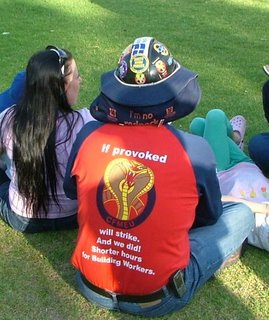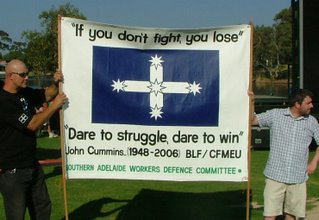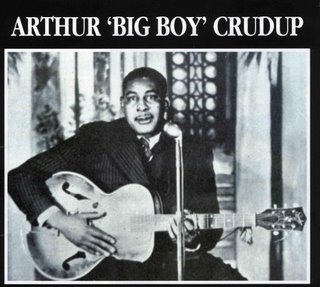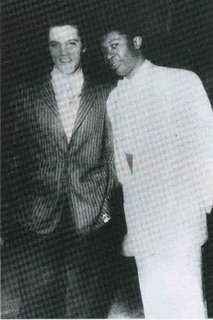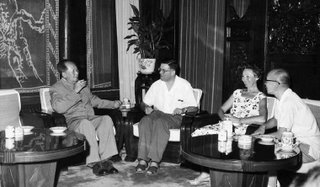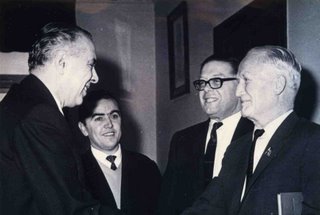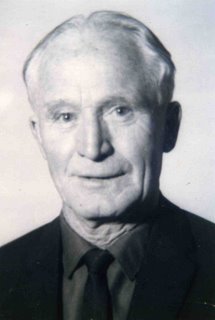
As a complement to this wartime memoir, I am putting up an excerpt from Curzio Malaparte’s The Volga Rises in Europe. Malaparte was an Italian journalist who accompanied German and Romanian troops in the invasion of the Ukraine through to the outskirts of Leningrad, from June 1941 to November 1942. On August 7, 1941, Malaparte writes of an "enemy, who is not fleeing in disorder but is retreating slowly, disputing every yard and punctuating his withdrawal with frequent counter-offensive thrusts by strong rearguards." He notes that the Soviet army leaves nothing on the battlefield in its retreat, taking everything from the corpses of its troops to abandoned helmets, strips of gauze bandages, pieces of paper – anything that may provide the Nazis with clues as to its organisational framework and combat circumstances.
It is only on the following day that Malaparte come across a mile-wide battlefield on which the Soviet soldiers had been hit by Messerchmitts and artillery, and had conducted a battle against German infantry from ten in the morning until sunset, and where the dead and mortally wounded and the detritus of their encampment were still in place. Malaparte notices a copy of Pravda, dated June 24, crumpled and mud-stained, its headlines announcing the outbreak of war. A little further along, he comes across a note-book and a large album illustrating the Third Five Year Plan "formulated by Stalin and still in course of realisation." He flicks through the album, and is interrupted by a German soldier who has noticed something in a tree: a loudspeaker, with wires trailing to the ground.
"A few yards from the tree, in a hole in the ground, we come upon the crumpled body of a Russian soldier. The dead man is leaning forward, covering with his chest a large metal box – a radiogram. Scattered all around in the grass are fragments of gramophone records. I try to piece together the fragments, to read the titles on the labels: The Internationale, the March of Budenny, the March of the Black Sea Fleet, the marches of the sailors of Kronstadt and of the Red Air Force. There are also some educational records dealing with social, political and military subjects.
"On the red label of one record I read the following words printed in black letters: "Na Podmogu Aghitatoru – Vidannaya Ts.K kp/6/U/No. 5 - 1941". It is a kind of phonographic catechism, a sort of manual of the perfect "agitator". The articles of this catechism were repeated by the deep, imperious voice of the loudspeaker with the aim of inspiring the soldiers to do their duty to the end. On another record are the words Poyasnityelni Text. This is undoubtedly another species of catechism, a kind of vade-mecum of the Communist soldier. A third record bears the inscription "Teche Ryechka Nyevyelicjka". It is the title of a "factory song", one of those songs to which the Bolsheviks have given the name tsavod.

"But my most interesting discovery is an album of twenty-four records, the cover of which bears this title: "Doclad Tovarshcha Stalina na Chrezvichainom VIII Vsyesoyuzom Syesdye Sovyetov 25 Noyabrya 1936 G. O Proyektye Konstitutsii Soyuza SSR." On the forty-eight sides of the twenty-four records is recorded the whole of the marathon speech delivered by Stalin in the Bolshoi Theatre, Moscow, on the occasion of the promulgation of the Soviet Constitution in 1936. The German soldier, who has been helping me to collect the fragments of the records, gazes at me in silence. Then he looks up and sees the loudspeaker hanging from the branches of the tree. He stares at the body of the Russian soldier, slumped over the metal casing of the radiogram. The German soldier’s face is serious, almost sad, with the sadness that in simple men is the companion of bewilderment and incomprehension. He is a peasant, this German soldier, not a worker - a Bavarian peasant from the Augsburg district. He does not possess what I would call "industrial morale", still less that of its principles, its abstractions, its violent and fanatical realism. (During the fighting, the words of Stalin, magnified to gigantic proportions by the loudspeaker, rain down upon the men kneeling in holes behind the tripods of their machine-guns, din in the ears of the soldiers lying amid the shrubs, of the wounded writhing in agony on the ground. The loudspeaker imbues that voice with a harsh, brutal, metallic quality. There is something diabolical, and at the same time terribly naïve, about these soldiers who fight to the death, spurred on by Stalin’s speech on the Soviet Constitution, by the slow, deliberate recital of the moral, social, political, and military precepts of the "agitators"; about these soldiers who never surrender; about these dead, scattered all around me; about the final gestures, the stubborn, violent gestures of these men who died so terribly lonely a death on this battlefield, amid the deafening roar of the cannon and the ceaseless braying of the loudspeaker.)"













